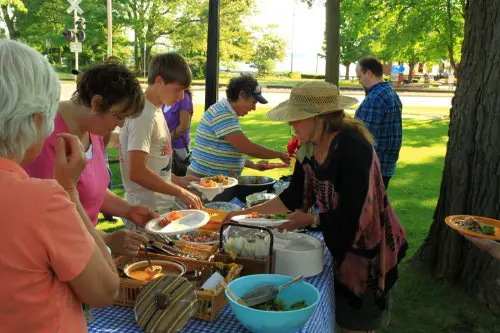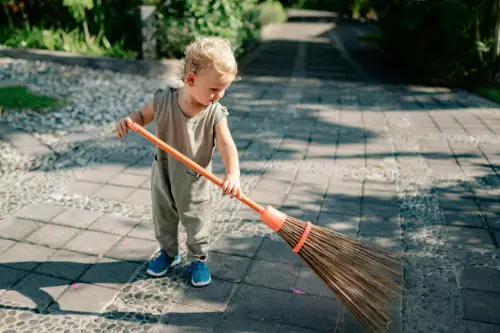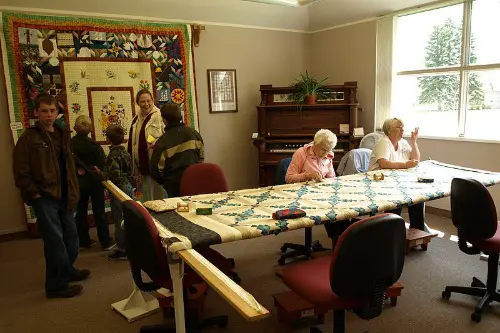1. Wearing Pajamas in Public

Your great-grandparents would be absolutely horrified to see people strolling through grocery stores in pajama pants and slippers. Back in their day, dressing appropriately for any outing—even a quick trip to the store—was a matter of self-respect. People wouldn’t dare leave the house without being properly dressed, and casualwear was still much more formal than what we consider today. The idea that someone would wear sleepwear outside of the bedroom would have been unthinkable.
The shift toward ultra-casual dress has been driven by comfort, changing fashion trends, and a more relaxed attitude toward formality, according to Ann Hoevel from CNN. While today’s mindset values convenience over appearances, older generations saw proper attire as a reflection of good manners. To them, wearing pajamas in public would signal laziness or a lack of self-discipline. They probably wouldn’t understand why anyone would voluntarily appear disheveled in front of others.
2. Ignoring Your Neighbors

For your great-grandparents, knowing your neighbors was a fundamental part of life, and ignoring them would have been seen as rude. Communities were tightly knit, and people relied on each other for help, company, and security. It was common to stop and chat over the fence, borrow a cup of sugar, or drop by unannounced for a visit. The idea of living next to someone for years without knowing their name would have been unthinkable.
Today, many people prefer privacy and tend to avoid unnecessary social interactions with neighbors, according to Joshua Foust from Quartz. With busy schedules, digital entertainment, and a culture that values personal space, fewer people make an effort to form close community bonds. While this independence has its benefits, it would probably make your great-grandparents shake their heads. They believed that being part of a community meant actually interacting with the people around you.
3. Swiping Through Dating Apps

The idea of finding a romantic partner by swiping through a list of strangers on a phone would have been utterly bizarre to your great-grandparents, Nish Chankar shares in The Varsity. In their time, relationships were often formed through family connections, church gatherings, or social events where people met face-to-face. Courtship was a structured process that involved serious intentions, not a quick scroll through profile pictures. The concept of casual dating or “talking to multiple people at once” would have seemed disrespectful and even reckless.
While modern dating offers more choices, it also comes with less commitment, something older generations wouldn’t have approved of. To them, a relationship was about building a future together, not just a temporary connection based on convenience. They would have found today’s fast-paced, technology-driven dating culture impersonal and confusing. The idea that a meaningful relationship could begin with a simple “swipe right” would have sounded like science fiction.
4. Talking About Money Openly

For your great-grandparents, discussing money in public or even among friends was considered inappropriate and tacky. Finances were a private matter, and people were expected to handle them discreetly, according to Samantha Sharf’s Forbes article. Flaunting wealth or complaining about financial struggles would have been seen as bad manners. Even within families, money was often a hushed topic, only discussed when absolutely necessary.
Today, it’s common for people to talk about salaries, side hustles, and financial goals with ease. Social media has made money discussions even more public, with people sharing their income, spending habits, and investment strategies. While transparency can be helpful, older generations would likely view it as lacking humility. They believed financial matters should be handled quietly and with a sense of dignity.
5. Eating on the Go

Your great-grandparents would be baffled by how often people eat meals while walking, driving, or even standing up. Mealtime used to be a sacred time to sit down with family, enjoy a home-cooked meal, and engage in conversation. Grabbing a quick bite from a drive-thru and eating it in the car would have seemed rushed and undignified. Meals weren’t just about nourishment; they were an important social and cultural ritual.
Fast food culture and busy modern schedules have made eating a more individual and hurried experience. While convenient, this shift has led to fewer shared meals and less emphasis on mindful eating. To your great-grandparents, the sight of someone shoveling food into their mouth while running to catch a bus would have seemed chaotic. They would have encouraged slowing down and making meals a meaningful part of the day.
6. Calling Instead of Visiting

Before the rise of the telephone, if you wanted to see someone, you simply knocked on their door. While phones made communication easier, personal visits were still considered the gold standard of socializing. Dropping by unannounced was completely normal and often welcomed. Your great-grandparents would have found it strange that people now feel inconvenienced by a surprise visit.
Today, most people expect a text or phone call before anyone comes over. Many even prefer digital communication over face-to-face interaction, finding it more efficient and less intrusive. While technology has made keeping in touch easier, it has also made visits feel like a formal event rather than a natural part of life. Your great-grandparents would have missed the days when seeing a friend or relative didn’t require scheduling in advance.
7. Letting Kids Talk Back

Respect for elders was a strict expectation in your great-grandparents’ time, and children were taught to obey without question. Talking back, rolling eyes, or arguing with parents would have been met with serious consequences. Discipline was often much stricter, with firm expectations about behavior and respect. The idea that a child could openly challenge their parents or teachers without punishment would have been shocking.
Modern parenting trends focus more on open communication and understanding children’s emotions. While this has benefits, older generations would have seen it as a lack of discipline. They believed in clear authority figures, and questioning that authority was simply not tolerated. Watching kids negotiate bedtime or refuse to do chores would have been beyond their comprehension.
8. Throwing Away Broken Items

In your great-grandparents’ era, if something broke, you fixed it. Whether it was mending clothes, repairing furniture, or tinkering with appliances, throwing something away was a last resort. Resources were scarce, and people took pride in making things last as long as possible. The idea of tossing out a perfectly good item just because of a minor flaw would have seemed incredibly wasteful.
Today, with cheap manufacturing and fast fashion, people replace items rather than repairing them. While this makes life more convenient, it also creates more waste and encourages disposable consumer habits. Your great-grandparents would have been stunned at how quickly people throw away things like shoes, electronics, or clothing. They believed in valuing possessions and getting the most use out of everything they owned.
9. Using Credit Cards for Everything

Your great-grandparents likely carried cash for most transactions and saw credit as something to be used sparingly. Debt was considered a burden, and people avoided it unless absolutely necessary, such as for buying a home. The idea of swiping a credit card for everyday purchases, from groceries to coffee, would have seemed reckless to them. They believed in living within their means and saving up for things rather than relying on borrowed money.
Today, using credit cards is a normal part of financial life, and many people rely on them for convenience, rewards, and building credit history. While this system has its benefits, it also encourages spending beyond one’s means, something older generations would have been wary of. They were more likely to buy only what they could afford with cash in hand. Watching people rack up debt on non-essentials would have made them deeply uncomfortable.
10. Spending Hours on Screens

If your great-grandparents could see people today glued to their phones, tablets, and laptops for hours, they’d be shocked. In their time, entertainment was more social, often involving radio programs, community dances, or simply sitting on the porch talking to neighbors. The idea of spending most of the day staring at a screen—whether for work, entertainment, or social media—would have been completely foreign. They would have struggled to understand why people spend more time engaging with technology than with each other.
While screens provide incredible convenience and connection, they also contribute to isolation and a decline in face-to-face interactions. Older generations valued real-world experiences, whether it was working with their hands, reading a book, or spending time outdoors. The sight of people scrolling through their phones at the dinner table or ignoring family members in favor of social media would have been upsetting to them. They would have urged people to look up, engage with others, and live in the present moment.
11. Ordering Everything Online

Your great-grandparents would have been amazed—and maybe a little horrified—by the idea of buying everything online instead of visiting a local store. Shopping used to be an in-person experience, where you built relationships with shopkeepers, examined products before buying, and supported local businesses. The thought of purchasing clothes, groceries, and even furniture without ever seeing them first would have seemed risky and impersonal. They valued the experience of going out, chatting with store owners, and taking pride in community commerce.
Today, online shopping is the norm, with everything from groceries to prescription medications being delivered to doorsteps. While it offers convenience, it also contributes to the decline of small businesses and reduces human interaction. Older generations would have missed the personal touch of a shopkeeper knowing their name or the simple pleasure of browsing a store in person. They might have also questioned the idea of trusting a package to show up just as expected.
12. Not Cooking at Home

Home-cooked meals were the standard for your great-grandparents, and eating out was reserved for special occasions. Cooking was a skill that everyone was expected to learn, and preparing meals from scratch was an essential part of daily life. The idea of eating takeout multiple times a week or relying on frozen meals would have been baffling to them. They saw food preparation as both a necessity and a way to bring families together.
Modern lifestyles prioritize convenience, and many people now order food regularly or rely on pre-packaged meals. While this saves time, it also means fewer people know how to cook or appreciate the effort that goes into a homemade meal. Your great-grandparents would have worried about the loss of cooking skills and the dependence on processed foods. They believed in taking the time to prepare nourishing meals rather than rushing through dinner.
13. Not Writing Letters

Handwritten letters used to be the main way people communicated over long distances, and receiving a letter in the mail was a cherished experience. Your great-grandparents would have put thought and effort into writing letters, often keeping up with friends and family through carefully crafted messages. The idea that people now rely on quick texts, emails, or emojis instead of writing full letters would have seemed impersonal and lazy to them. Letters were seen as a meaningful way to connect, and they were often saved as keepsakes.
While digital communication is much faster, it lacks the personal touch that letters once provided. Older generations would have been saddened by how rare it is to receive a handwritten note today. They would have encouraged people to take the time to write something meaningful instead of just sending a quick “how are you?” text. To them, a handwritten letter showed care, effort, and thoughtfulness in a way that digital messages simply can’t match.
14. Letting Strangers Handle Your Personal Information

Your great-grandparents were extremely cautious about privacy and would have been shocked at how willingly people today give away their personal information. They kept important documents locked away, used cash for purchases to avoid a paper trail, and were skeptical of giving out personal details over the phone. The idea of sharing personal data with companies, social media platforms, or even apps on a smartphone would have been deeply unsettling. They valued privacy and would have been wary of how much information is now collected and stored.
Today, people freely enter their credit card details online, share personal updates on social media, and allow companies to track their habits for targeted advertising. While convenience plays a big role in this shift, it has also led to concerns about security and privacy breaches. Your great-grandparents would have advised more caution and questioned why so many people trust large corporations with their private information. They would have reminded everyone that once something is shared, it’s nearly impossible to take it back.
15. Not Knowing Basic Survival Skills

Older generations grew up knowing how to grow their own food, sew clothes, fix broken items, and navigate without GPS. These were everyday skills, not hobbies or niche interests. Your great-grandparents would have been concerned to see how dependent modern society has become on technology and convenience. The idea that many people wouldn’t know how to start a fire, mend a torn jacket, or grow a vegetable garden would have been alarming to them.
While modern conveniences have made life easier, they’ve also made people less self-sufficient. Many essential skills have been replaced by quick fixes, outsourcing, or simply buying new things instead of repairing them. Your great-grandparents would have encouraged learning these skills as a way to stay prepared and independent. They would have believed that knowing how to take care of yourself without relying on technology was a sign of strength and resourcefulness.
16. Letting Work Take Over Life

For your great-grandparents, work was important, but it wasn’t supposed to consume every waking moment. They believed in a clear separation between work and personal life, with evenings and weekends reserved for family, rest, and community. The modern expectation of being constantly available—checking emails after hours, answering work calls during vacations—would have seemed excessive and unhealthy. They valued hard work, but they also understood the importance of balance.
Today, many people feel pressure to always be “on,” leading to burnout and stress. The concept of a 9-to-5 job has blurred, with remote work and constant connectivity making it harder to truly disconnect. Your great-grandparents would have been disappointed to see how little time people spend truly relaxing. They would have reminded everyone that life is about more than just work—it’s about family, community, and enjoying the simple moments.
17. Not Appreciating the Simple Things

Life for your great-grandparents wasn’t always easy, but they found joy in simple pleasures—homemade meals, a well-tended garden, a good conversation. They didn’t need flashy technology, endless entertainment, or social media validation to feel fulfilled. The idea that people today often feel bored unless they have constant stimulation would have seemed strange to them. They would have valued patience, gratitude, and the ability to find happiness in everyday moments.
Modern life is full of distractions, making it easy to overlook the small joys that once defined daily living. Your great-grandparents would have encouraged slowing down and appreciating what’s right in front of you. They understood that true happiness doesn’t come from having more, but from making the most of what you have. If they could give advice today, it would probably be to live simply, appreciate what matters, and focus on real connections rather than fleeting distractions.


